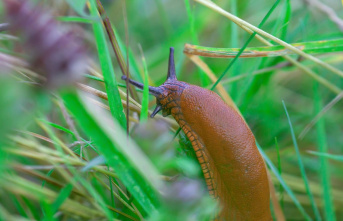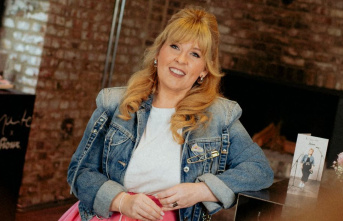Joy Crookes once said that food is a form of resistance. Because if you eat, you ensure that you survive. The question of a favorite meal when meeting in her dressing room in Hamburg's Elbphilharmonie seems obvious. "Rice," is the answer. "I like rice so much I got 'rice' tattooed on my hip," says Joy Crookes, offering to show off the tattoo. She gets up from her chair, pulls the waistband of her jeans down a little and sure enough, the word "rice" is written there, discreetly and in simple cursive.
This scene has the openness and authenticity, the surprising, the witty and the profound - after all, rice isn't just food and food isn't just sustenance for the London singer - that makes Joy Crookes and her music what it is.
She taught herself piano, bass and guitar and was able to spend whole days playing them as a teenager. She found an audience on YouTube and through it her management, who became aware of Crookes' cover version of "Hit the Road Jack". She was just 14 then. She told "Rolling Stone" that she was proud that she had taken her time. "I've always fought for artistic and creative integrity."
For this she is rewarded. She received a nomination for the 2020 Brits Rising Star Award and scored fourth place in the 2020 BBC Sound Poll. Last year she was awarded the video for her song "Feet Don't Fail Me" at the UK Music Video Awards.
After Hamburg she goes to Los Angeles. She is playing a concert there and is a guest on James Cordon's "Late Late Show" for the second time this year.
She says she doesn't see herself as famous. "Other people heal cancer and we don't treat them like they're famous. I used to serve sauerkraut in a restaurant a few years ago. I'm still the same person." She is always recognized when she goes to a concert or a bar, but people respect the fact that she wants to enjoy the evening in peace.
Joy Crookes cannot be pinned down to a genre, her music is inspired by neo-soul and alternative R
Then Crookes adds that she generally has her problems with comparisons of this kind. "When you're a female musician, people always have to compare you to someone else. As if we couldn't be understood any other way."
As a woman in the music industry, you would always encounter prejudice. "Actually with everything that has to do with cables." When setting up shows, in the guitar shop - women are often treated "damn condescendingly". She used to notice that more often than she does now. But what is also due to the fact that she surrounds herself with people who would not think like that, adds her manager Charlie, who is in the room during the conversation.
The cloakroom is on the 10th floor of the Elbphilharmonie, outside the city and the harbor are just beginning to shine in the evening light. Later in the evening Crookes will give a concert as part of the Reeperbahn Festival.
What has occupied the UK in recent weeks has been the death of Queen Elizabeth II. How did Crookes, the daughter of an Irish father and a Bangladeshi mother, see it? She only says two sentences: "It's such a historical moment. And I think it's important at such a moment to deal with history."
They regard culture as currency. Growing up in the "melting pot of London" is the most classic "London thing" in the world. Cultural diversity is such a wealth.
The United Kingdom not only has a new king, but also recently a new government. If she held back on the monarchy, Crookes is now handing out politics. "Britain is already suffering from poverty. The next few months are going to be terrible. And it's affecting even the middle class. We have a cost of living crisis in the country. The welfare state has been abolished. I've been thinking more and more lately that I should be demonstrating. It's absolutely fucked."
Joy Crookes has previously featured the UK in a song. It's called "Kingdom", released in autumn 2021 on their album "Skin". The song is about a lack of prospects and poverty - in a time before the war in Ukraine, the energy crisis, further government crises and the consequences of Brexit. It feels incredible to sing this song now, says Crookes. It has a whole new meaning.
Crookes gets political in "Kingdom" and there's bound to be more of that in the future; a new album is announced for 2023. "There's more anger in me. I feel like I've lost quite a bit of patience." It's probably because she's growing up and having more experiences. "I'm seething and surging. There's so much I want to write about."
But before you can write a political song, a lot has to happen subconsciously. Otherwise it quickly happens that you simply point your finger at someone. "I don't have the answers with my music, but I can show what's going wrong."
One political song that she thinks does this brilliantly is Prince's "Sign O' Times". Crookes picks up her phone, types something, then reads: "You turn on the telly and every other story is tellin' you somebody died / A sister killed her baby 'cause she couldn't afford to feed it / And yet we're sending people to the moon". "It's just great," she says.
The singer describes bleak prospects. What are you hoping for? The answer sounds hopeless at first: When the "rock bottom" is reached, when many people have reached the bottom, then a new subculture will emerge. Because Britain is great when it comes to subculture. Joy Crookes cites punk and reggae as examples. Instead of differences and rivalries, she sees commonalities between her generation and that of the baby boomers: "You remember the time under Margaret Thatcher. My hope is that people will say: Enough is enough. That they will go out and demonstrate."
When Joy Crookes appears a few hours later in the main hall of the Elbphilharmonie, the concert is well attended but not sold out. The people sit, which is fine with the quiet pieces, but it's a shame with the faster ones. Smaller groups get up from their seats during the concert and dance further back in front of the wall. They are almost exclusively young women.
Sources: Rolling Stone, Vogue, Diffus, Instagram












